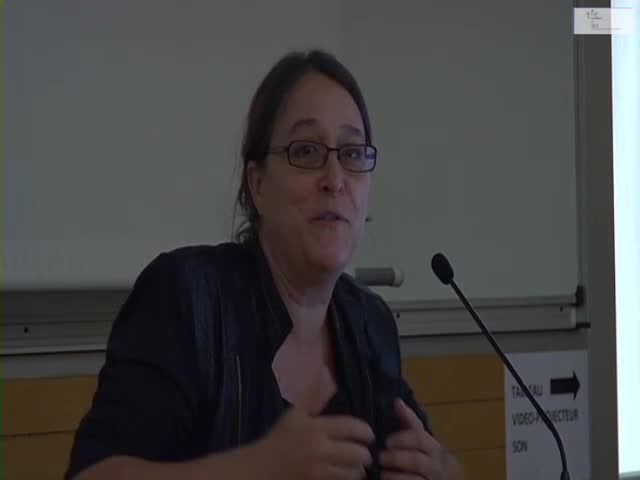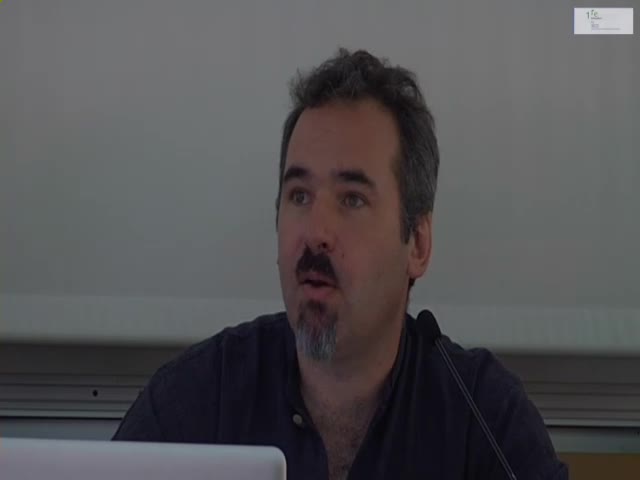Notice
Séminaire Urmis Nice "Frontières et altérité" - Séance du 12 janvier 2018 à 14h30 avec Hans Siebers, (Tilburg University), "In search of the factors and mechanisms that erect ethnic boundaries , in institutional settings"
- document 1 document 2 document 3
- niveau 1 niveau 2 niveau 3
Descriptif
Séminaire diffusé en streaming de 14h30 à 16h30.
La vidéo sera consultable en différé à partir du lundi 15 janvier 2018.
Publication de référence :
Hans SIEBERS (2017) What turns migrants into ethnic minorities at work? Factors erecting ethnic boundaries among Dutch police officcers. Sociology, 51(3): 608-625.
http://journals.sagepub.com/doi/10.1177/0038038515598282
Abstract
Transnational migration flows have revitalised the interest in ethnicity in social sciences. The ethnic boundary approach (Barth, Wimmer) argues for a non-essentialist understanding of ethnicity and calls for detecting the factors that turn migrants into ethnic minorities. Based on ethnographic fieldwork among Dutch police officers between 2008 and 2013, this article presents three factors that together constitute a structural framework that produces events of ethnic boundary construction (salient ethnic identity plus ethnic closure) between migrant and non-migrant officers: (1) ethnicised precarity; (2) ethnic conflicts triggered by the ethnicising discourse in Dutch media and politics on migrants and migration; and (3) the quasi-therapeutic management style applied in the police organisation. It further calls for a differentiated understanding of migrants’ precarity, questions explanations of ethnic closure in terms of stereotypes and critically scrutinises socio-psychological approaches of ethnicity and diversity management.
Keywords cultural fundamentalism, discrimination, diversity, ethnicity, ethnic boundaries, ethnic inequality, labour control, labour market, migrants, precarity
Thème
Documentation
Liens
Sur le même thème
-
Handicaps et travail : discriminations en raison du handicap dans l'emploi
DucretMarie PatriciaLefevreDidierDidier Lefevre - Causeries Handicaps - Handicaps et travail #2 - Discriminations en raison du handicap dans l'emploi
-
Table ronde 2/ Le post-capitalisme sera féministe, antiraciste et écologique
VergèsFrançoiseDans le cadre de ses 60 ans, la Fondation Maison des sciences de l'homme organise le colloque international "Capitalisme, anticapitalisme et sciences sociales engagées à l'échelle globale : autour de
-
Société inclusive : une question d'actualité - L’approche par la situation
WalkerAlanMeistermannChristianHôteJean-MichelFougeyrollasPatrickComment la primauté à l’interaction entre l’environnement et la personne participe à la refondation de l’action publique et des pratiques professionnelles qui construisent la société inclusive ?
-
Entretien avec Christian Meistermann sur la Société inclusive
MeistermannChristianEntretien avec Christian Meistermann, représentant régional Grand-Est de APF France handicap
-
Le Brésil, vu par Rebecca Lemos Igreja
Lemos IgrejaRebeccaLa Fondation Maison des sciences de l'homme soutient les milieux intellectuels évoluant dans des pays marqués par divers obstacles à la liberté académique. Pour ce faire elle accompagne des chercheurs
-
Catherine Quiminal : La République et ses étrangers. Cinquante années de rencontre avec l’immigrati…
QuiminalCatherineIntervention de Catherine Quiminal lors du séminaire Migrations et altérités (Urmis Nice) : "La République et ses étrangers. Cinquante années de rencontre avec l’immigration malienne en France"
-
Paris transformé. Le Marais 1900-1980 : de l’îlot insalubre au secteur sauvegardé Onglets principau…
Historienne de l’urbain, Isabelle Backouche présente son dernier livre en montrant comment s’articulent la gestation et le lancement d’un aménagement parisien et la volonté partagée par plusieurs
-
La fabrique ordinaire d’inégalités multidimensionnelles
Au plan utopique, le pluralisme égalitaire – qu’il soit culturel, linguistique, alimentaire, religieux, d’orientation sexuelle…- se déploierait sans inégalités ni hiérarchies ni oppressions. Il est
-
L'engagement violent féminin : comparaison de contournements discursifs sous le nazisme et sous l'É…
Comment les femmes engagées dans les univers idéologiques fondés sur la violence hyper-masculine justifient-elles leur participation active? Cette communication visera à comprendre l’interaction
-
L'accueil des étudiants et étudiantes en situation de handicap à l'université#3
DachezJulieL'INSHEA vous présente une série de trois vidéos portant sur l'inclusion des étudiants et étudiantes en situation de handicap à l'université. #3 Quels sont les écueils à éviter ?
-
« L’éducation inclusive », visée et moyens. La question des instruments
PotvinMaryseEducation et diversité Première rencontre du Réseau international Education et diversité (RIED) 20-22 octobre 2014, Ecole supérieure du professorat et de l’éducation, Marseille Résumé Cette
-
La discrimination comme enjeu et levier de la formation professionnelle à l’école
Dhume-SonzogniFabriceEducation et diversité Première rencontre du Réseau international Éducation et diversité (RIED) 20-22 octobre 2014, Ecole supérieure du professorat et de l’éducation, Marseille Résumé














